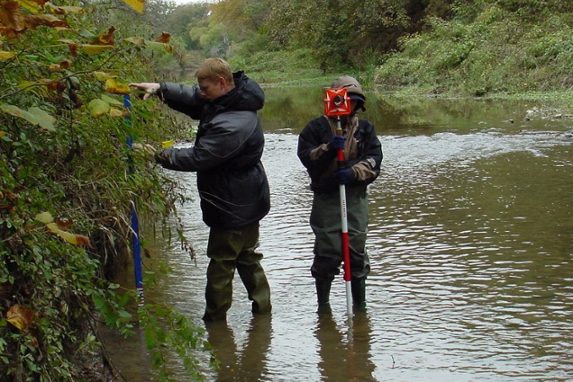B.S. in Environmental Science
One of the only programs in Texas with a soil science concentration, our environmental science bachelor’s degree takes a multidisciplinary, integrated approach to understanding biological, geological and human factors that affect environmental quality. Through broad coursework and hands-on learning experiences, you can explore and discover your environmental interests while preparing for a wide variety of jobs in environmental sciences. You can also specialize in an area of environmental sciences by choosing one of four concentrations:
- Science
- Soil Science
- Geospatial Information Science (GIS)
- Policy
Our curriculum offers diverse opportunities to gain practical understanding of land and water resources, human impacts on the environment and environmental law and policies. Learn how to assess environmental conditions and provide environmental remediation using tools such as geographic information systems and remote sensing.
As an environmental science major at Tarleton, you will gain marketable skills in effective environmental management to protect the health and future of our planet and our people.
What is Environmental Science?
Environmental science is an interdisciplinary field that integrates physical, biological and information sciences to study the effects of natural and man-made processes, as well as physical interactions of the planet, on the environment. Research helps environmental scientists identify, control or eliminate sources of pollutants or biological hazards.
At Tarleton, we focus on addressing environmental and human concerns affecting soil, air and water quality, such as the diminishing availability of resources and the increasing frequency of droughts. Join us in helping to protect the environment, improve public health and inform government policies.

Estimated Completion
120 Credit Hours (4 years)
Application Process
Cost
Locations Available
Department
College
What Can You Do With Your Bachelor’s Degree in Environmental Science?
Entry-level jobs in environmental science, including scientist and specialist roles, are varied and plentiful. You could work in many different fields and industries, such as:
- Soil Science and Conservation
- Air and Water Quality Management
- Environmental Compliance
- Environmental Education and Communication
- Environmental Consulting
- Land Use and Land Restoration
- Law and Regulation
- Environmental Planning and Conservation
- Waste Management
Many of our graduates work for the USDA-Natural Resource Conservation Service, the Texas Commission on Environmental Quality, the U.S. Army Corps of Engineers, the Texas A&M University system and Lockheed Martin. Some attend law school for a career in environmental law.
You may also be interested in attending graduate school in Tarleton’s MS in Agricultural and Natural Resource Sciences or MS in Environmental Science degree programs.
How Much Do Environmental Science Graduates Make?
The median annual salary for environmental scientists and specialists was over $71,000 in May 2018, according to the U.S. Bureau of Labor Statistics.
Why Major in Environmental Science?
We strive to meet the academic and professional needs of our students in a diverse and ever-changing field through coursework and applied learning experiences.
What Classes Will You Take as an Environmental Science Major?
Our environmental sciences bachelor’s degree program provides you with diverse knowledge and skills through a variety of courses, including field work. Study topics such as ecological restoration for range and forest systems, soil science, environmental management, geographic information systems and land use management. Learn techniques in re-vegetation, prescribed fire and grazing, restoration of historic vegetation and more.
View all required classes for the environmental science bachelor’s degree.
Accreditations
How Do You Get Started on Your Bachelor’s Degree in Environmental Science?
Take the next step toward earning your bachelor’s degree in environmental science. We have the resources to help you get started.
What Bachelor’s Degrees are Related to Environmental Science?
- BS in Wildlife, Sustainability and Ecosystem Science
- BS in Geoscience
- BS in Environmental Engineering
- BS in Biology






